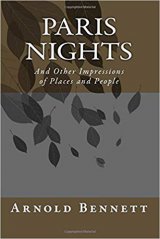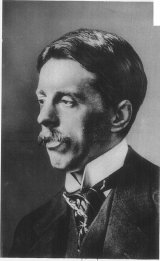Paris Nights and Other Impressions of Places and People Page #5
Enoch Arnold Bennett (27 May 1867 - 27 March 1931) was an English writer. He is best known as a novelist, but he also worked in other fields such as the theatre, journalism, propaganda and films. Bennett was born in a modest house in Hanley in the Potteries district of Staffordshire. Hanley was one of the Six Towns that were joined together at the beginning of the 20th century as Stoke-on-Trent and are depicted as "the Five Towns" in some of Bennett's novels. Enoch Bennett, his father, qualified as a solicitor in 1876, and the family moved to a larger house between Hanley and Burslem.
- Year:
- 1913
- 108,219 Views
III--EVENING WITH EXILES I lived up at the top of the house, absolutely alone. After eleven o’clock in the morning, when my servant left, I was my own doorkeeper. Like most solitaries in strange places, whenever I heard a ring I had a feeling that perhaps after all it might be the ring of romance. This time it was the telegraph-boy. I gave him a penny, because in France, much more than in England, every one must live, and the notion still survives that a telegram has sufficient unusualness to demand a tip; the same with a registered letter. I read the telegram, and my evening lay suddenly in fragments at my feet. The customary accident, the accident dreaded by every solitary, had happened. “Sorry, prevented from coming to-night,” etc. It was not yet six o’clock. I had in front of me a wilderness of six hours to traverse. In my warm disgust I went at once out in the streets. My flat had become mysteriously uninhabitable, and my work repugnant. The streets of Paris, by reason of their hospitality, are a refuge. The last sun of September was setting across the circular Place Blanche. I sat down at the terrace of the smallest café and drank tea. Exactly opposite were the crimson wings of the Moulin Rouge, and to the right was the establishment which then held first place among nocturnal restaurants in Montmartre. It had the strange charm of a resort which is never closed, night or day, and where money and time are squandered with infantile fatuity. Somehow it inspired respect, if not awe. Its terrace was seldom empty, and at that hour it was always full. Under the striped and valanced awning sat perhaps a hundred people, all slowly and deliberately administering to themselves poisons of various beautiful colours. A crowd to give pause to the divination of even the most conceited student of human nature, a crowd in which the simplest bourgeois or artist or thief sat next to men and women exercising the oldest and most disreputable professions--and it was impossible surely to distinguish which from which! Out of the medley of trams, omnibuses, carts, automobiles, and cabs that continually rattled over the cobbles, an open fiacre would detach itself every minute or so, and set down or take up in front of the terrace. Among these was one carrying two young dandies, an elegantly dressed girl, and another young girl in a servant’s cap and apron. They were all laughing and talking together. The dandies and the elegancy got out and took a vacant table amid the welcoming eager bows of a maître d’hotel, a chasseur, and a waiter. She was freshly and meticulously and triumphantly got up, like an elaborate confection of starched linen fresh from the laundress. Her lips were impeccably rouged. She delighted the eye by her health and her youth and her pretty insolence. A single touch would have soiled her, but she had not yet been touched. Her day had just begun. Probably, her bed was not yet made. The black-robed, scissored girls of the drapery store at the next angle of the place were finishing their tenth hour of vigil over goods displayed on the footpath. And next to that was a creamery where black-robed girls could obtain a whole day’s sustenance for the price of one glass of poison. Evidently the young creature had only just arrived at the dignity of a fashionable dressmaker, and a servant of her own. Her ingenuous vanity obliged her to show her servant to the place, and the ingenuous vanity of the servant was content to be shown off; for the servant might have a servant to-morrow--who could tell? The cabman and the servant began to converse, and presently the cabman in his long fawn coat and white hat descended and entered the vehicle and sat down by the servant, and pulled out an illustrated comic paper, and they bent their heads over it and giggled enormously in unison; he was piling up money at the rate of at least a sou a minute. Occasionally the young mistress threw a loud sisterly remark to the servant, who replied gaily. And the two young dandies bore nobly the difficult rôle of world-worn men who still count not the cost of smiles. Say what you like, it was charming. It was one of the reasons why Paris is the city which is always forgiven. Could one reasonably expect that the bright face of the vapid little siren should be solemnised by the thought: “To-day I am a day nearer forty than I was yesterday”? The wings of the Moulin Rouge, jewelled now with crimson lamps, began to revolve slowly. The upper chambers of the restaurant showed lights behind their mysteriously-curtained windows. The terrace was suddenly bathed in the calm blue of electricity. No austere realism of the philosopher could argue away the romance of the scene. ***** I turned down the steep Rue Blanche, and at the foot of it passed by the shadow of the Trinité, the great church of illicit assignations, at whose clock scores of frightened and expectant hearts gaze anxiously every afternoon; and through the Rue de la Chaussée d’Antin, where corsets are masterpieces beyond price and flowers may be sold for a sovereign apiece, and then into the full fever of the grand boulevard with its maddening restlessness of illuminated signs. The shops and cafés were all on fire, making two embankments of fire, above which rose high and mysterious façades masked by trees that looked like the impossible verdure of an opera. And between the summits of the trees a ribbon of rich, dark, soothing purple--the sky! This was the city. This was what the race had accomplished, after eighteen Louises and nearly as many revolutions, and when all was said that could be said it remained a prodigious and a comforting spectacle. Every doorway shone with invitation; every satisfaction and delight was offered, on terms ridiculously reasonable. And binding everything together were the refined, neighbourly, and graceful cynical gestures of the race; so different from the harsh and awkward timidity, the self-centred egotism and artistocratic hypocrisy of Piccadilly. It seemed difficult to be lonely amid multitudes that so candidly accepted human nature as human nature is. It seemed a splendid and an uplifting thing to be there. I continued southwards, down the narrow, swarming Rue Richelieu, past the immeasurable National Library on the left and Jean Goujon’s sculptures of the rivers of France on the right, and past the Theatre Français, where nice plain people were waiting to see L’Aventurière, and across the arcaded Rue de Rivoli. And then I was in the dark desert of the Place du Carrousel, where the omnibuses are diminished to toy-omnibuses. The town was shut off by the vast arms of the Louvre. The purple had faded out the sky. The wind, heralding October, blew coldly across the spaces. The artfully arranged vista of the Champs Elysées, rising in flame against the silhouette of Cleopatra’s needle, struck me as a meretricious device, designed to impress tourists and monarchs. Everything was meretricious. I could not even strike a match without being reminded that a contented and corrupt inefficiency was corroding this race like a disease. I could not light my cigarette because somebody, somewhere, had not done his job like an honest man. And thus it was throughout.
Translation
Translate and read this book in other languages:
Select another language:
- - Select -
- 简体中文 (Chinese - Simplified)
- 繁體中文 (Chinese - Traditional)
- Español (Spanish)
- Esperanto (Esperanto)
- 日本語 (Japanese)
- Português (Portuguese)
- Deutsch (German)
- العربية (Arabic)
- Français (French)
- Русский (Russian)
- ಕನ್ನಡ (Kannada)
- 한국어 (Korean)
- עברית (Hebrew)
- Gaeilge (Irish)
- Українська (Ukrainian)
- اردو (Urdu)
- Magyar (Hungarian)
- मानक हिन्दी (Hindi)
- Indonesia (Indonesian)
- Italiano (Italian)
- தமிழ் (Tamil)
- Türkçe (Turkish)
- తెలుగు (Telugu)
- ภาษาไทย (Thai)
- Tiếng Việt (Vietnamese)
- Čeština (Czech)
- Polski (Polish)
- Bahasa Indonesia (Indonesian)
- Românește (Romanian)
- Nederlands (Dutch)
- Ελληνικά (Greek)
- Latinum (Latin)
- Svenska (Swedish)
- Dansk (Danish)
- Suomi (Finnish)
- فارسی (Persian)
- ייִדיש (Yiddish)
- հայերեն (Armenian)
- Norsk (Norwegian)
- English (English)
Citation
Use the citation below to add this book to your bibliography:
Style:MLAChicagoAPA
"Paris Nights and Other Impressions of Places and People Books." Literature.com. STANDS4 LLC, 2025. Web. 11 Mar. 2025. <https://www.literature.com/book/paris_nights_and_other_impressions_of_places_and_people_110>.








Discuss this Paris Nights and Other Impressions of Places and People book with the community:
Report Comment
We're doing our best to make sure our content is useful, accurate and safe.
If by any chance you spot an inappropriate comment while navigating through our website please use this form to let us know, and we'll take care of it shortly.
Attachment
You need to be logged in to favorite.
Log In